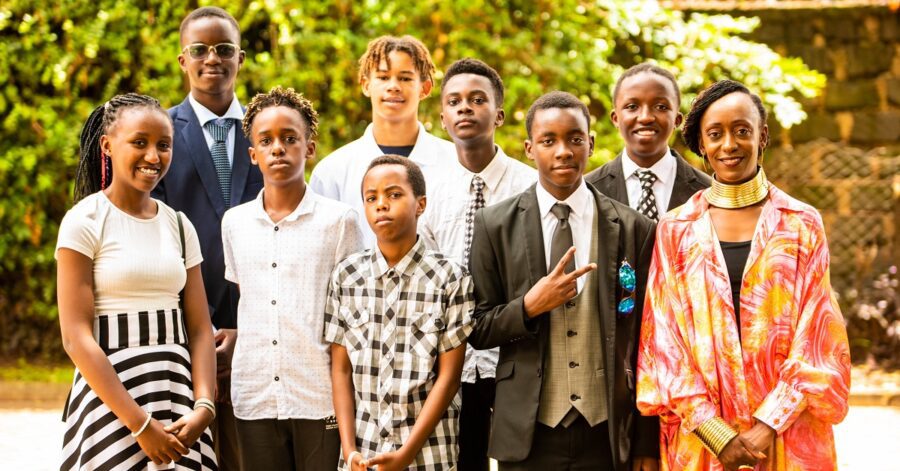In the following post, homeschool dad Eugene Huang discusses the state of homeschooling in Taiwan and explores how the concepts of coram Deo, Christian paideia, and the Great Commission can yield fruit for classical, Christian education.
Numbers about Taiwan
In celebration of the upcoming launch of The Math Map: Complex, I would like to begin with a few numbers from Taiwan:
- The total population of Taiwan is around 23.4 million.
- Approximately 1.1 million (4.7%) identify as Christians.
- In Taiwan, there are three types of non-school-based experimental education: individual, group, and institutional. The first two types are usually referred to as homeschooling.
- In the 2017–18 academic year, the total number of students enrolled in non-school-based experimental education was 5,598, of which homeschoolers accounted for 3,733 students.
- In the 2022-23 academic year, the numbers above jumped to 10,609 and 5,254, respectively.1“Summary of Students at Non-School-Based of Experimental Education” Ministry of Education, Taiwan, https://stats.moe.gov.tw/files/ebook/Education_Statistics/112/112edu_A_1_10.xlsx
- The first officially licensed CC community in Taiwan was established in 2017.
- In the 2023–24 academic year, there were 143 students in 6 Classical Conversations communities around the island.
What Do These Numbers Tell Us?
First of all, Christians do not exist in great numbers compared to the total population. Second, from 2017 to 2023, more and more parents in Taiwan chose non-school-based education. Students enrolled in institutes increased by 5,011 while the number of homeschoolers grew by 1,521. Last, Classical Conversations has been taking root and sprouting over the last seven years on this island. At the same time, Classical Conversations’ growth rate has been noticeably mild.
The causes for this are complex.
Where are the children of Christian families? Who is educating them? What kind of education are they receiving?
I’m neither a mathematician nor a statistician, but I am nevertheless unashamedly a curious everyday educator practicing classical tools of learning. On that note, I would say the possible causes of this slow growth may include insufficient outreach, lack of awareness, language barriers, fear of being incapable of homeschooling, worries about college preparation, concerns that CC is not a good fit for them, etc.
Or, perhaps the God-centered, parent-led classical Christian education offered by CC simply takes more time to brew.
Regardless of the circumstances, I maintain that growing deeper roots by finding coherence in the concepts of coram Deo, Christian paideia, and the Great Commission will yield fruit for earnest Christian parents and their children.
Let the exploration begin!
Coram Deo: The Essence of the Christian Life
Christians are followers and imitators of Christ. How, then, should Christians live?
Live like Christ. To put it simply, the Latin phrase “coram Deo” means “before the face of God.” In an article titled “What Does ‘Coram Deo’ Mean?”, R. C. Sproul explained: “To live coram Deo is to live one’s entire life in the presence of God, under the authority of God, to the glory of God.”
Life in the Presence of God
God is omnipresent. In and out of church, in the marketplace or in the home school, we need to understand there is no escaping from God.
Life under the Authority of God
This calls for an awareness of God’s sovereignty over all and involves voluntary submission rather than subjection out of fear of being punished. The sovereignty of God means God is in control of everything all the time.
“And we know that for those who love God all things work together for good, for those who are called according to his purpose.” (Rom 8:28).
There is no separating from God’s love.
Life to the Glory of God
The first question-and-answer of the Westminster Larger Catechism (1648) succinctly claims:
- What is the chief and highest end of man?
Man’s chief and highest end is to glorify God, and fully to enjoy Him forever.
A self-denying and God-honoring life finds imperishable joy in the presence of God. Any other goal and ambition will seem unimportant in the light of His glory.
More to the point, as R. C. Sproul wrote: “To live all of life coram Deo is to live a life of integrity. It is a life of wholeness that finds its unity and coherency in the majesty of God. A fragmented life is a life of disintegration. It is marked by inconsistency, disharmony, confusion, conflict, contradiction, and chaos.”
However, quite a few Christian parents and students approach life with compartmentalism, leaving God at church and keeping Him out of education. The aftermath is evident as reflected in the widespread lack of love of learning and disinterest in seeking truth, goodness, and beauty.
And so a genuine Christian life calls for a Christian paideia.
Christian Paideia: The Enculturation of the Kingdom Citizen
“Fathers, do not provoke your children to anger, but bring them up in the discipline and instruction of the Lord.” (Eph 6:4, ESV)
To better understand this statement, let’s define our terms first. The Greek word for “discipline” is “paideia.” According to Douglas Wilson, to the Greeks, “the paideia was all-encompassing and involved nothing less than the enculturation of the future citizen.”2Wilson, Douglas. The Paideia of God and Other Essays on Education. Moscow, Id, Canon Press, 1999, p. 9-15
And Merriam-Webster defines “enculturation” as “the process by which an individual learns the traditional content of a culture and assimilates its practices and values.”
How should Christians make sense of these ideas?
Enculturation Is All-Encompassing
Douglas Wilson explained that Christian paideia is much more than taking children to church, having family time for devotions, and providing a classical Christian curriculum. Paideia involves bringing an ideal culture about so that the task of shaping an ideal man can be maintained. Besides academics, Christians should also be mindful of the whole of the surrounding cultures (the people, books, songs, movies, etc.) that instruct and influence our children.
Enculturation Is Intentional
What Robert Bortins, the CEO of Classical Conversations, wrote in the 2024 catalog echoed the importance of Christian paideia and resonated with me:
“Now more than ever, we cannot be neutral. It is time to intentionally weave a Christ-centered worldview into every aspect of our children’s lives. We begin with a Christian curriculum that glorifies the Creator and not the creation, one with God in the center and not our students. In the communities of Classical Conversations, we explore what the Bible says about math, science, history, and more. Your views will be strengthened, not undermined.”36. Bortins, Robert. 2024 Homeschool with a Friend. Classical Conversations Multi Media, Inc, 2023, p. 2
We have to be conscious, determined, and purposeful. We must enculturate our children with a Christian worldview through a God-centered education in the hope of equipping them to go into the world but not conform to the world.
With an intentionally established culture as manifested in classical Christian communities, Christian paideia is possible even in Taiwan.
Enculturation Is Integral
As exhorted by Paul in Ephesians 6:4, it is required of Christian fathers to nurture, train, and teach the bodies, minds, and souls of their children. This way, they may see everything through the lens of Christianity and “come into their own personhood before God.”4The Reformation Study Bible. R. C. Sproul et al, eds. Nashville: Thomas Nelson, 1995.
These will be the generations of those who seek to obey Him in everything they do, whose point of view is holistic and eternal.
This reminds me of one of my favorite jokes:
My classmate was bitten by a ‘hundred-pace viper.’ It’s said that, having been bitten by such a viper, one is sure to die after walking a hundred paces. He insisted on walking down the mountain to the hospital . . . but when he was about ninety-something steps in, I saw that something wasn’t quite right, and I was certain he only had one step left to live. So, I caught a few more hundred-pace snakes to bite him dozens of times. I figured that should add up to a few thousand steps, right?!
This is a joke, but this is also no joke.
It is a joke because the math is correct, but the result is fatal. It is no joke because of how true it is that so many parents approach education this way.
Without an integrated perspective, whatever seems logical and pragmatic right here and right now may eventually do us a substantial disservice.
The Great Commission: The Evangelization of One’s Own Children
“Go therefore and make disciples of all nations, baptizing them in the name of the Father and of the Son and of the Holy Spirit, teaching them to observe all that I have commanded you. And behold, I am with you always, to the end of the age.” (Matt 28:19-21, ESV)
Christians are familiar with this command from Jesus Christ, and a multitude of believers are faithfully fulfilling the commission. Christian parents, may I suggest we go home and make disciples of our children first? Parents are entrusted with children, and it is our responsibility to lead these precious souls to Jesus.
How do we lead the children?
Lead by Learning
As the disciples learned from their Teacher Jesus, so should parents first become disciples of Jesus and learn to be faithful stewards of the Word of God. Leigh Bortins wrote, “I believe children learn best when their parents and teachers are their heroes.”5Bortins, Leigh A. The Core: Teaching Your Child the Foundations of Classical Education. New York: Palgrave Macmillan, 2010.. When parents take the lead in learning, children will follow suit.
Lead by Teaching
After learning comes teaching. Teach the whole counsel of God, all the essential things as God revealed concerning our salvation and service to Him. Sin, repentance, faith redemption, regeneration, resurrection, salvation, God’s judgment. Teach children in the way they should go, so that they will not depart from it even when they are old.
Lead by the Power of the Holy Spirit
Finally, we can do nothing apart from the power of the Holy Spirit. We need to follow the lead of the Spirit so we can obey the Word of God that we learn and teach. When children see a submissive life combined with persistent prayer, we lead them not by might nor power, but by the Spirit of the Lord. (Zech 4:6)
Lead Learners, Assemble!
It is my humble hope and prayer that when Christian parents in Taiwan earnestly seek a deeper understanding of the coherence of coram Deo, Christian paideia, and the Great Commission, they will find the sublime value of the God-centered, parent-led Classical Christian communities.
All in all, this great and glorious task is calling for serious Christian parents who are willing to be lead learners in all aspects of the Christian life and yearning for intentional whole-person training together with like-minded believers.
Raising our children, by the power of the Holy Spirit, to be brothers and sisters in the Lord Jesus Christ is fulfilling the Great Commission. I believe it is truly a good endeavor worth doing that is beautiful in the sight of our Father in Heaven.
“Therefore, my beloved brothers, be steadfast, immovable, always abounding in the work of the Lord, knowing that in the Lord your labor is not in vain.” (1 Cor 15:58, ESV)
May the grace and peace of the Lord be with you all!





